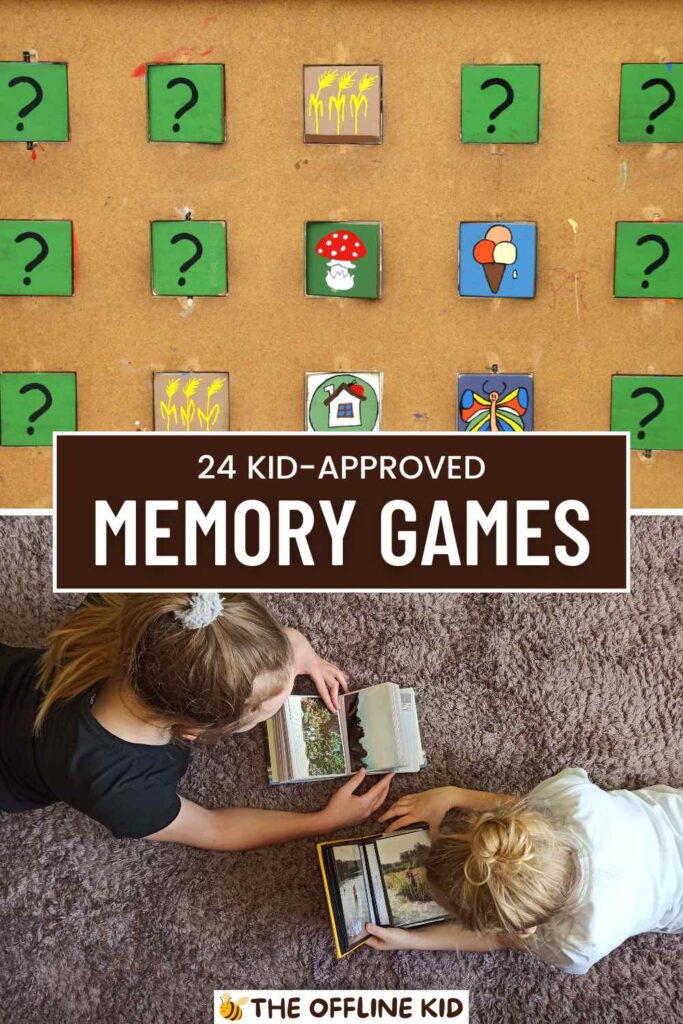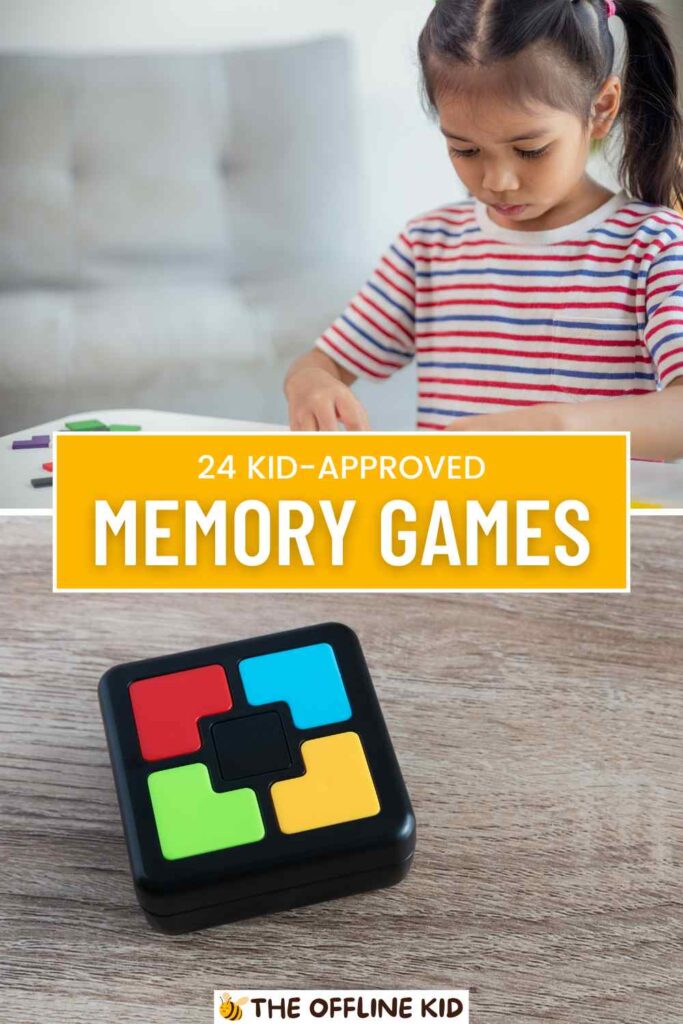Welcome to the ultimate guide to memory games for kids!
Discover 24 fun and engaging activities that boost memory, concentration, and creativity. Perfect for family time and educational fun!
Classic Memory Games
Memory Card Match
Memory Card Match is a timeless game that’s easy to set up and great for boosting memory and concentration. Here’s how to play:
- Setup: Gather a deck of memory cards with matching pairs. You can buy these or make your own using index cards.
- How to Play:
- Shuffle the cards and lay them face down in a grid pattern.
- Players take turns flipping over two cards at a time, trying to find matching pairs.
- If a match is found, the player keeps the cards and takes another turn. If not, the cards are turned back over, and the next player takes their turn.
- The game continues until all matches are found.
- Variations:
- Younger Kids: Use fewer cards or cards with easily recognizable images.
- Older Kids: Increase the number of cards or use more complex images.
Simon Says
Simon Says is a classic game that improves memory and listening skills. It’s perfect for groups and can be played anywhere.
- How to Play:
- One player is “Simon” and gives commands to the other players, starting with “Simon says…”
- Players must follow the commands only if they start with “Simon says.” If a player follows a command without “Simon says,” they are out.
- Example commands: “Simon says touch your nose,” “Simon says hop on one foot.”
- Tips:
- Make It Challenging: Increase the speed of the commands or use trickier instructions.
- Fun Variations: Add themes, like animal actions or silly movements.
I Packed My Bag
This game enhances memory and vocabulary skills. It’s ideal for long car rides or waiting times.
- How to Play:
- Players sit in a circle. The first player starts by saying, “I packed my bag and in it I put…” followed by an item.
- The next player repeats the sentence and adds another item. Each player must recall and list all previous items in the correct order before adding their own.
- Example: “I packed my bag and in it I put a book, a teddy bear, and a flashlight.”
- Benefits: This game helps with sequential memory and language skills.
20 Questions
20 Questions is a guessing game that sharpens deductive reasoning and memory.
- How to Play:
- One player thinks of an object, person, or place.
- The other players take turns asking yes or no questions to guess what it is.
- After each answer, players try to narrow down the possibilities based on the information gathered.
- The game continues until the players guess correctly or reach 20 questions.
- Example Questions: “Is it a living thing?” “Is it bigger than a breadbox?”
These classic memory games are perfect for any occasion and can be easily adapted to suit different age groups and settings. They offer a wonderful way for kids to have fun while improving their memory skills.
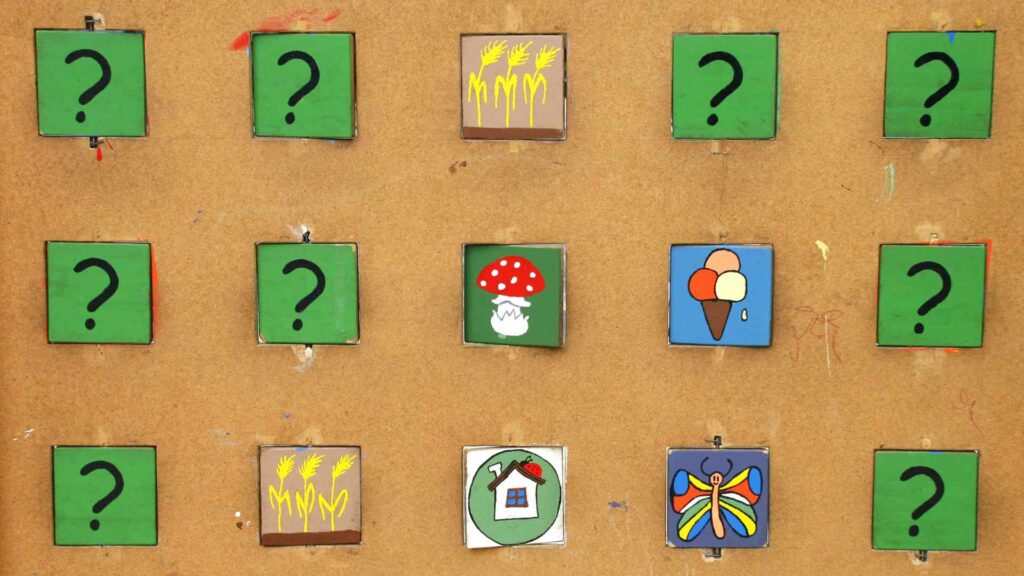
DIY Memory Games
Personalized Memory Cards
Create personalized memory cards using family photos or favorite themes to make this game extra special:
- How to Create:
- Print duplicate copies of chosen images or themes on cardstock.
- Cut them into pairs of cards.
- Optionally, laminate them for durability.
- Gameplay:
- Follow the rules of Memory Card Match using your custom cards.
- Players match pairs while enjoying familiar pictures.
- Variations:
- Story Memory: Arrange cards to tell a story.
- Theme Challenges: Match cards by theme or color.
Story Chain
Enhance creativity and memory with this collaborative storytelling game:
- How to Play:
- Start a story with a sentence or phrase.
- Each player adds a sentence to continue the story.
- Recite the entire story from the beginning.
- Benefits:
- Boosts memory by recalling story details.
- Encourages teamwork and creativity.
- Variations:
- Setting Challenges: Limit stories to specific themes.
- Character Additions: Introduce new characters per turn.
Object Memory Tray
Strengthen visual memory with this simple and engaging game:
- Setup:
- Place several small items on a tray.
- Allow players to view the tray for a set time.
- Cover the tray and ask players to list as many items as possible.
- Benefits:
- Enhances visual recall skills.
- Suitable for all ages with adjustable difficulty.
- Variations:
- Speed Rounds: Decrease viewing time for a challenge.
- Theme Trays: Use items related to specific themes.
Memory Jar
Create a memory jar filled with notes or small items to stimulate recollection:
- Setup:
- Decorate a jar or container with your child.
- Write memories or place small items inside.
- Gameplay:
- Draw notes or items from the jar.
- Share related memories or stories.
- Benefits:
- Fosters reminiscence and emotional connections.
- Promotes storytelling and family bonding.
- Variations:
- Guess the Memory: Describe the memory without revealing details.
- Themed Jars: Create jars based on different topics or events.

Active Memory Games
Scavenger Hunt
Turn memory into an adventure with a scavenger hunt that combines physical activity and mental agility:
- Setup:
- Create a list of items or clues related to your home or outdoor space.
- Hide items or place clues in various locations.
- Gameplay:
- Players use their memory to find and collect all items or solve clues.
- Team up for cooperative play or compete individually for added excitement.
- Benefits:
- Enhances spatial awareness and observational skills.
- Encourages physical activity while sharpening memory.
Dance Sequence
Combine music and memory in a lively dance sequence game:
- How to Play:
- Choose a sequence of dance moves or actions.
- Players take turns repeating and adding to the sequence.
- Increase the complexity as players master each round.
- Benefits:
- Improves auditory and motor memory.
- Boosts coordination and rhythm skills.
- Variations:
- Theme Dances: Create sequences based on different music genres or themes.
- Mirror Dance: Repeat moves in reverse order, challenging memory in a playful way.
Follow the Leader
Engage memory and mimicry with a classic game of Follow the Leader:
- How to Play:
- Designate a leader who performs various actions or movements.
- Players mimic the leader’s actions in sequence.
- Rotate leaders to keep the game dynamic and challenging.
- Benefits:
- Enhances observational and memory skills.
- Promotes social interaction and leadership development.
- Variations:
- Memory Challenges: Increase the number or complexity of actions.
- Team Follow: Divide into teams for cooperative play.
Hopscotch Memory
Add a memory twist to traditional hopscotch for active outdoor fun:
- Setup:
- Draw a hopscotch grid with numbered squares.
- Assign memory challenges to each square (e.g., recite a sequence of numbers, name items from a category).
- Gameplay:
- Players hop through the squares, completing memory challenges at each stop.
- Advance to the next square upon successful completion.
- Benefits:
- Improves cognitive flexibility and memory recall under physical exertion.
- Enhances balance and motor skills.
- Variations:
- Memory Race: Compete to finish the hopscotch course with the fewest mistakes.
- Themed Challenges: Customize challenges based on educational topics or personal interests.
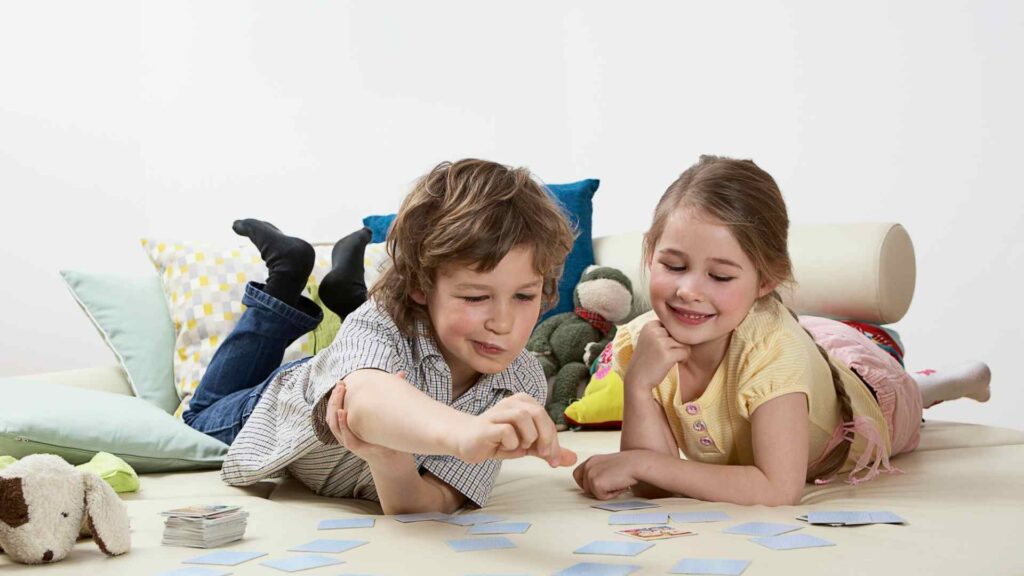
Group Memory Games
Telephone
Telephone is a fun and challenging game that tests memory and communication skills:
- How to Play:
- Players sit in a circle.
- The first player whispers a phrase or sentence to the next player.
- Each player whispers what they heard to the next person.
- The last player announces the message aloud, often with humorous results due to misunderstandings.
- Tips:
- Increase Difficulty: Use longer phrases or add more players to the circle.
- Variations: Try different themes or topics for messages.
Charades
Charades with a memory twist adds excitement to guessing games:
- How to Play:
- Players act out words or phrases without speaking while others guess.
- Add a memory challenge by asking players to remember all the words acted out during the game.
- Benefits:
- Enhances memory recall and creativity.
- Improves non-verbal communication skills.
- Variations:
- Theme Nights: Choose specific themes for charades (e.g., animals, movies).
- Team Charades: Divide into teams for competitive play.
Memory Relay
Create a dynamic team game that combines memory and cooperation:
- Setup:
- Divide players into teams and set up a relay course.
- Place items or cards with information along the course.
- Gameplay:
- Teams race to memorize and recall information from each station.
- Players must correctly remember and pass on the information before their team can move forward.
- Benefits:
- Encourages teamwork and strategic thinking.
- Improves memory retention under time pressure.
- Variations:
- Obstacle Courses: Introduce physical challenges between memory stations.
- Trivia Relay: Use educational questions or facts instead of objects.
Musical Memory
Challenge auditory memory with a musical twist on traditional memory games:
- How to Play:
- Play snippets of songs or musical pieces.
- Players recall the titles, artists, or lyrics associated with each snippet.
- Increase difficulty by playing shorter clips or mixing genres.
- Benefits:
- Enhances auditory memory and music appreciation.
- Encourages active listening and attention to detail.
- Variations:
- Genre Challenges: Focus on specific music genres or eras.
- Guess the Instrument: Identify instruments played in each snippet.
Educational Memory Games
Math Memory Match
Combine math skills with memory in an engaging card game:
- Setup:
- Create pairs of cards with math problems and their solutions.
- Use addition, subtraction, multiplication, or division depending on the players’ skill level.
- Gameplay:
- Players match cards by solving the math problems and finding their corresponding solutions.
- Encourage quick mental math for added challenge.
- Benefits:
- Reinforces mathematical concepts and operations.
- Improves problem-solving skills and memory retention.
- Variations:
- Operation Focus: Focus on a specific math operation (e.g., addition cards only).
- Word Problem Cards: Create cards with word problems for advanced players.
Spelling Bee Memory
Enhance vocabulary and spelling skills with a memory-based spelling bee:
- Setup:
- Prepare a list of words suitable for the players’ age and skill level.
- Organize players in a spelling bee format with a moderator.
- Gameplay:
- Each player spells a word aloud, then adds a new word to the sequence.
- Players must remember and correctly spell each word in the sequence.
- Benefits:
- Strengthens spelling accuracy and word recall.
- Builds confidence in public speaking and memory under pressure.
- Variations:
- Category Rounds: Spell words related to specific categories (e.g., animals, colors).
- Speed Rounds: Increase the pace for advanced players.
Science Facts Recall
Turn learning into a game with science facts recall challenges:
- Setup:
- Create cards or questions with science facts and concepts.
- Focus on topics like animals, plants, space, or scientific discoveries.
- Gameplay:
- Players take turns answering science-related questions or recalling facts from the cards.
- Encourage discussions and explanations for deeper understanding.
- Benefits:
- Enhances scientific knowledge retention and comprehension.
- Promotes curiosity and critical thinking skills.
- Variations:
- Experiment Challenges: Introduce hands-on experiments related to the science facts.
- Team Quizzes: Divide players into teams for collaborative learning and competition.
History Timeline
Explore history through memory with a timeline-building game:
- Setup:
- Provide a list of historical events or figures.
- Players arrange the events in chronological order to create a timeline.
- Gameplay:
- Players take turns placing events on the timeline and explaining their significance.
- Encourage discussions about cause-and-effect relationships in history.
- Benefits:
- Improves historical knowledge retention and chronological thinking.
- Develops storytelling skills and appreciation for historical context.
- Variations:
- Theme Timelines: Focus on specific historical periods or civilizations.
- Interactive Maps: Use maps to visualize historical events and locations.
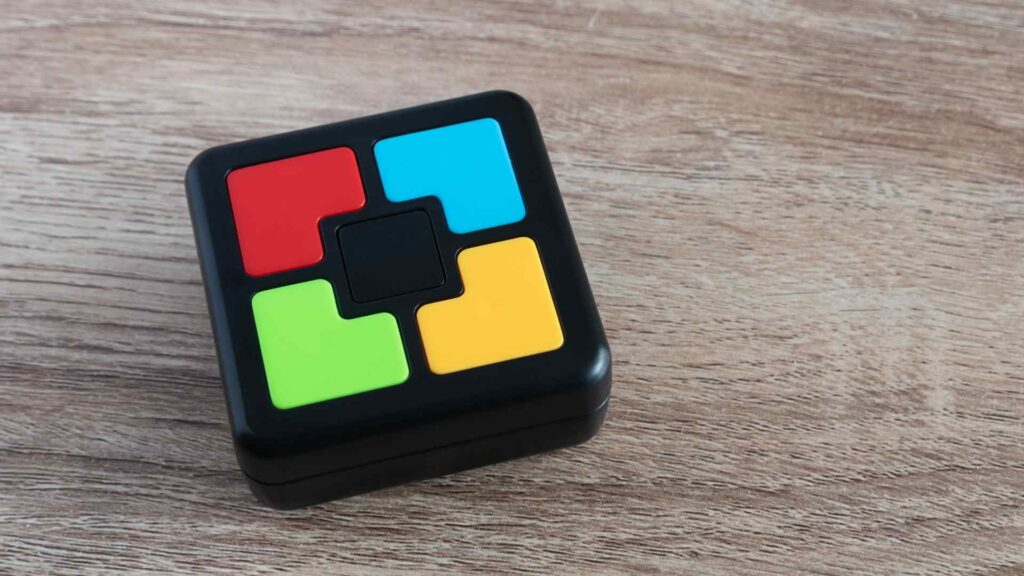
Tech-Enhanced Memory Games
Memory Apps and Games
Explore the world of memory-enhancing apps and games designed for kids:
- Overview:
- Discover a variety of apps available on tablets and smartphones.
- These apps offer interactive and engaging memory challenges.
- How to Use Effectively:
- Choose apps that align with your child’s age and interests.
- Set appropriate time limits for screen usage.
- Benefits:
- Enhances memory skills through interactive gameplay.
- Provides instant feedback and progress tracking.
- Recommended Apps:
- Lumosity: Offers a range of brain-training games including memory exercises.
- Peak: Features personalized workouts to improve memory, focus, and problem-solving.
- Elevate: Focuses on communication, math, and memory skills through engaging challenges.
Digital Memory Cards
Transform traditional memory games into digital formats for added convenience and variety:
- Creating Digital Cards:
- Use online tools or apps to create digital versions of memory cards.
- Include images, themes, or educational content.
- Playing the Game:
- Play on tablets, computers, or smartphones.
- Follow the rules of Memory Card Match using digital cards.
- Advantages:
- Easy accessibility and portability.
- Allows for customization and frequent updates.
- Recommended Tools:
- Canva: Create custom memory cards with templates and graphics.
- Quizlet: Make digital flashcards for memory challenges and educational purposes.
Online Memory Challenges
Engage in memory challenges with online platforms and communities:
- Finding Games:
- Explore websites and apps that offer memory games for kids.
- Look for platforms that provide safe and age-appropriate content.
- Playing Safely:
- Monitor screen time and ensure parental controls are in place.
- Encourage healthy online habits and supervision.
- Benefits:
- Connects kids with peers in a virtual learning environment.
- Offers a variety of game formats and difficulty levels.
- Recommended Platforms:
- PBS Kids: Provides educational games, including memory challenges.
- National Geographic Kids: Offers interactive quizzes and memory exercises.
- Funbrain: Features a range of memory games and puzzles for kids.
Virtual Reality Memory Games
Immerse in virtual worlds with memory-enhancing games and experiences:
- Exploring VR Games:
- Discover virtual reality games designed to improve memory skills.
- VR technology enhances engagement and immersion in gameplay.
- Benefits:
- Enhances spatial awareness and cognitive abilities.
- Provides a multisensory learning experience.
- Recommended VR Games:
- MindShow: Allows players to create and share interactive stories, enhancing memory and creativity.
- Lumosity VR: Offers a range of brain-training exercises, including memory challenges in a virtual environment.
- Nature Treks VR: Combines relaxation with memory exercises through virtual nature exploration.
Conclusion
Memory games are more than just fun activities for kids—they’re powerful tools for cognitive development and learning.
By engaging in a variety of memory games, children not only sharpen their recall abilities but also enhance concentration, critical thinking, and social skills.
Whether playing classic games like Memory Card Match or exploring tech-enhanced options, these activities provide valuable opportunities for growth and enjoyment.
